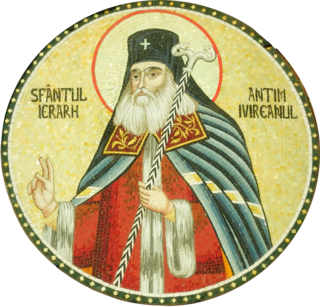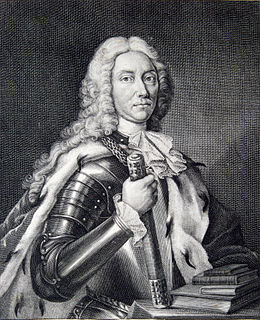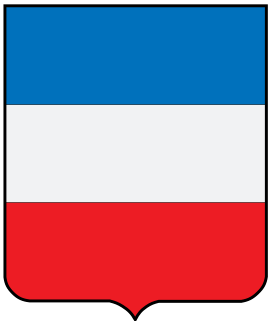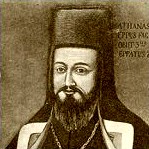 W
WAtanasie Anghel Popa was a Romanian Greek-Catholic bishop of Alba Iulia between 1698 and 1713. He was the successor to Teophilus Seremi in the seat of Mitropoliei Bălgradului (Alba-Iulia). Through his continued efforts, he perfected the union of the Romanian Transylvanians with the Catholic Church.
 W
WAnthim the Iberian was a Georgian theologian, scholar, calligrapher, philosopher and one of the greatest ecclesiastic figures of Wallachia, led the printing press of the prince of Wallachia, and was Metropolitan of Bucharest in 1708–1715.
 W
WPetru Pavel Aron (1709–1764) was Bishop of Făgăraş and Primate of the Romanian Greek Catholic Church from 1752 to his death in 1764. He also translated the Biblia Vulgata into Romanian (1760–1761).
 W
WIoan Bob, was Bishop of Făgăraş and Primate of the Romanian Greek Catholic Church from 1783 to his death in 1830.
 W
WConstantin Brâncoveanu was Prince of Wallachia between 1688 and 1714.
 W
WPârvu III Cantacuzino, also known as Pârvul or Pîrvu Cantacuzino, was a high-ranking Wallachian statesman who served intermittently as Spatharios and Ban of Oltenia, primarily known as the leader of an anti-Ottoman rebellion. Holding sway over a Russophile faction within the Wallachian boyardom, he briefly served as an officer in Russia's Imperial Army during the Russo-Turkish War of 1768-1774. Pârvu was a member of the Cantacuzino family, which made him a descendant of several Wallachian Princes, and was joined in all of his political and military actions by his younger brother, the Vistier Mihai.
 W
WDimitrie or Demetrius Cantemir, also known by other spellings, was a Moldavian soldier, statesman, and man of letters. He was twice voivode of Moldavia. During his second term, he allied his state with Russia in their war against Moldavia's Ottoman overlords; Russia's defeat forced Cantemir's family into exile and the replacement of the native voivodes by the Greek phanariots. Cantemir was also a prolific writer, variously a philosopher, historian, composer, musicologist, linguist, ethnographer, and geographer. His son Antioch, Russia's ambassador to Great Britain and France and a friend of Montesquieu and Voltaire, would go on to be known as "the father of Russian poetry".
 W
WNicolae Costin (1660–1712) was a Moldavian chronicler.
 W
WIon Cuza or Cuzea, commonly known as Ioniță Cuza, was a Moldavian statesman and political conspirator, remembered as one of the first Romanian nationalists and Freemasons. His paternal family, the Cuzas (Cuzeas), were landowners of uncertain origin who, by the time of Ioniță's birth, had been established into the boyardom, being under the patronage of Doukas and Sturdza aristocrats. Ioniță's mother was a direct descendant of the statesman-chronicler Miron Costin; his father, Miron Cuza, had been involved in the pro-Habsburg conspiracy headed by François Ernaut, while his grandfather, Dumitrașco Cuzea, had been hanged during the clampdown. As boyars, both the Cuzas and the Costins opposed the Phanariote regime and devised other schemes to emancipate Moldavia from the Ottoman Empire.
 W
WAlecu Filipescu-Vulpea, also known as Aleco Filipescul, Alecsandru R. Filipescu or Alexandru Răducanu Filipescu, was a Wallachian administrator and high-ranking boyar, who played an important part in the politics of the late Phanariote era and of the Regulamentul Organic regime. Beginning in the 1810s, he took an anti-Phanariote stand, conspiring alongside the National Party and the Filiki Eteria to institute new constitutional norms. Clashing with the National Party over the distribution of spoils, and only obtaining relatively minor positions in the administration of Bucharest, Filipescu eventually joined a clique of boyars that cooperated closely with the Russian Empire. His conditional support for the Eterists played out during the Wallachian uprising of 1821, when Vulpea manipulated all sides against each other, ensuring safety for the boyars. He returned to prominence under Prince Grigore IV Ghica, but sabotaged the monarch's political reform effort and also seduced his wife Maria. She was probably the mother of his only son, Ioan Alecu Filipescu-Vulpache.
 W
WGrigore II Ghica was Voivode (Prince) of Moldavia at four different intervals — from October 1726 to April 16, 1733, from November 27, 1735 to 14 September 1739, from October 1739 to September 1741 and from May 1747 to April 1748 — and twice Voivode (Prince) of Wallachia: April 16, 1733 – November 27, 1735 and April 1748 to September 3, 1752. He was son of Matei Ghica.
 W
WAntiochus or Antioch Kantemir or Cantemir was a Moldavian who served as a man of letters, diplomat, and prince during the Russian Enlightenment. He has been called "the father of Russian poetry".
 W
WIoan Lemeni was an ethnic Romanian prelate in the Kingdom of Hungary, who served as Bishop of Făgăraş and Primate of the Romanian Greek Catholic Church from 1833 to his resignation in 1850.
 W
WGrigore Gavrila Maior, O.S.B.M., was Bishop of Făgăraş and Primate of the Romanian Greek Catholic Church from 1773 to his resignation in 1782.
 W
WPetru Maior was a Romanian writer who is considered one of the most influential personalities of the Age of Enlightenment in Transylvania. Maior was a member of the Greek-Catholic clergy, a historian, philosopher, and linguist.
 W
WInocențiu Micu-Klein (1692–1768) was a Bishop of Făgăraș and Primate of the Romanian Greek Catholic Church from 1730 to his resignation in 1751. He played an instrumental role in the establishment of national rights for Romanians in Transylvania.
 W
WSamuil Micu Klein was a Romanian Greek-Catholic theologian, historian, philologist and philosopher, a member of the Enlightenment-era movement of Transylvanian School.
 W
WIoan Giurgiu Patachi was Bishop of Făgăraș and Primate of the Romanian Greek Catholic Church from 1721 to his death in 1727.
 W
WMihai or Mihail Racoviță was a Prince of Moldavia on three separate occasions and Prince of Wallachia on two occasions. His rules overlapped with the accession of Phanariotes in the Danubian Principalities – he is considered himself a Phanariote for the duration of his last rule in Moldavia and his rules over Wallachia.
 W
WAtanasie Rednic (1722–1772) was Bishop of Făgăraş and Primate of the Romanian Greek Catholic Church from 1765 to his death in 1772.
 W
WSofronie of Cioara is a Romanian Orthodox saint. He was an Eastern Orthodox monk who advocated for the freedom of worship of the Romanian population in Transylvania.
 W
WVasile Ursu Nicola (1731 in Arada, Principality of Transylvania – 28 February 1785 in Karlsburg, known as Horea was a Transylvanian peasant who, with Ion Oarga and Marcu Giurgiu, led the two-month-long peasant rebellion that began in the Metaliferi Mountain villages of Curechiu and Mestecanis in late 1784 and that was known as the Revolt of Horea, Cloșca and Crișan.
 W
WSamuil Vulcan was the Bishop of the Diocese of Oradea Mare of the Romanian Greek Catholic Church from 1806 to 1839.